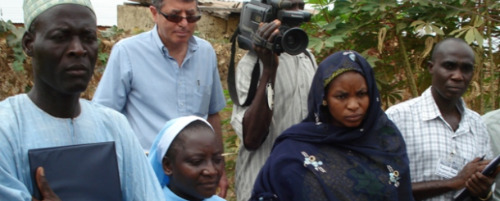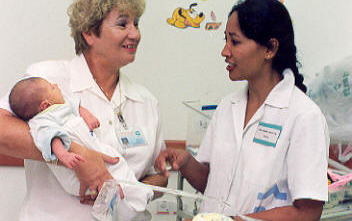As requests for Israeli know-how multiply across the globe, Haim Divon, head of MASHAV, Israel’s Center for International Cooperation, strives to supply specific solutions.

Career diplomat Haim Divon found his calling in the pages of the National Geographic magazines his parents encouraged him to read when he was a boy. But he could not have known then that his yearning to visit exotic places would so successfully dovetail with the mission of MASHAV, the Center for International Cooperation, that he now heads as deputy director-general of Israel’s Ministry of Foreign Affairs.
MASHAV was founded in 1958 as a vehicle for sharing Israel’s creative solutions with the rest of the developing world. At the time, Divon was just eight years old and his Jerusalem family was still feeling the pinch of nationwide austerity rationing.
“I heard [first Israeli Prime Minister David] Ben-Gurion talking about our moral obligation to share with others at a time when we had no food and had to absorb more people than our actual population,” says Divon. “He was a pragmatist but also a philosopher. That is where I come from.”
Training for 200,000
MASHAV has long focused on the same objectives that the United Nations recently formalized as its priority development goals: Poverty alleviation; food security; sustainable development; empowerment of women; child and maternal health; social equity; environmental sustainability; and upgraded public health and education systems.
MASHAV professionals have trained some 200,000 people from approximately 140 countries, including Israel. In countries across the world, they have developed dozens of demonstration projects in fields of Israeli expertise.
Divon came to MASHAV in 1995, after serving in diplomatic postings in Bombay, Ethiopia and Sri Lanka.
“It was more than eye-opening to see what was happening out there,” he says. “What hits you is the real meaning of poverty and human suffering. In the western hemisphere we live in a bubble and we don’t grasp the real challenges of this global village of ours, which is getting smaller.”
Concentrating on key ‘agents of change’

After serving as Israel’s ambassador to Canada, Divon returned to MASHAV in 2005. His current objective is orienting the staff to offer need-specific solutions on demand. The standardized programs in which the agency had invested so much money and expertise over the past 50 years generated plenty of good will toward Israel but were difficult to quantify in terms of lasting effect.
“By coordinating better with our partner countries and with third parties, we have a better chance to succeed,” says Divon, who also is CEO of a government company, Igud, that provides MASHAV a platform to run extension centers in Israel and recruit Israeli experts who form its permanent nucleus.
Among MASHAV’s current projects are helping the mayor of Kisumu, Kenya’s third largest city, to establish a strategic planning unit to empower periphery cities and training Ethiopia’s head agronomist in biotech and irrigation methods, to enhance yields at a mango and avocado nursery that it established in that African nation. “They must boost their quality and diversity for local consumption, and exports must meet certain standards. We can show them how,” Divon declares.
MASHAV has a long history of dispatching medical aid around the world. A recent example was a delegation of six doctors from Sheba Medical Center that was sent to the Democratic Republic of Congo following a July 2 fuel tanker explosion that injured some 200 people. Also this year, MASHAV facilitated the creation of neonatal and intensive care units at hospitals in Ghana and Kenya and a new ICU for the hospital in Port Au Prince, Haiti is underway.
However, whenever possible the preferable approach is to bring key “change agents” from beneficiary countries to Israel to see programs in action and hear from experts on the ground. This summer, for instance, MASHAV hosted a contingent of educators from Moscow for pedagogic training.
Focus on contributions, not conflict
Beyond practical solutions, MASHAV also strives to pass along the can-do spirit that visitors invariably marvel at. This spirit is personified in the multilingual Divon himself, his New York-born wife, Linda, and their three grown children. In their frequent and extensive travels, members of the Divon family have initiated and participated in projects such as a Canadian ‘peace camp’ for Israeli and Palestinian children.
Divon’s many aspirations for MASHAV are not easy to achieve on a total budget of about $20 million – an amount the Minister for Foreign Affairs would like to triple. Demands for Israeli know-how continue to grow, especially now that Israel is a member of the Organization for Economic Cooperation and Development.
He hopes that one day the high level of appreciation for Israeli aid that emanates from developing countries will be matched in the rest of the world. That can only happen, he believes, when the media pays as much attention to Israel’s contributions as to its conflicts.
“Imagine how people would look up to Israel if every activity in every country we are involved in would get front-page headlines,” he concludes.













